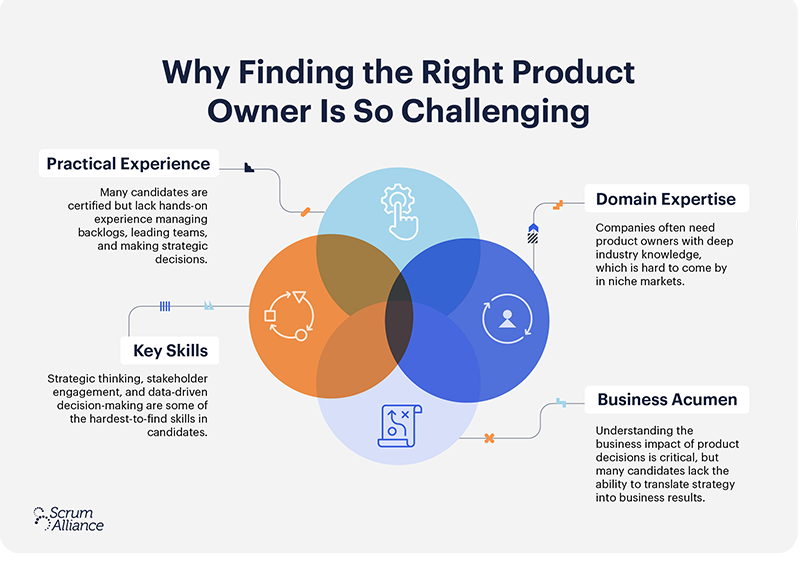Learn about purchasing for teams
Why You're Struggling to Find the Right Product Owner

Hiring the right product owner is becoming increasingly complex for many organizations due to high demand and the need for more strategic skills. As expectations for product owners evolve, identifying candidates who can balance technical skills, business acumen, and leadership capabilities has become more difficult.
According to the Product Owner Skills in the New World of Work Report, 66% of organizations report that they find recruiting product owners with the right mix of skills very challenging.
Let's examine the challenges organizations face when recruiting product owners and how you can improve your hiring process to overcome those challenges.
The evolving role of product owners
According to the Scrum Guide, the product owner's responsibility is to maximize the product's value resulting from the scrum team's work. The product owner is also accountable for managing the product backlog, defining and communicating the product goals, and making sure the backlog is transparent and understood by the team.
However, the product owner role has evolved significantly over the last two decades. Companies now expect product owners to take on more strategic responsibilities, such as engaging with stakeholders, shaping the product vision, and aligning product development with business goals.
In fact, 71% of financial services firms and 62% of technology companies look for product owners to play a key role in driving strategic and transformational initiatives. This shift has led to a growing skills gap. Many organizations struggle to identify candidates who can both manage daily tasks and drive long-term product strategy.
Unlike some other agile roles, such as scrum masters, product owners haven't had a clear career path that leads to more senior product owner positions. Many experienced product owners move into roles like product management or business leadership, creating a shortage of product owners with advanced strategic experience in the market.
Challenges in hiring the right product owner
While many product owners bring tactical experience, finding candidates with the strategic skills organizations need is often difficult. The product owner skills report identifies four key areas where companies struggle the most.

Source: Product Owner Skills in the New World of Work report
Practical experience
While certifications like the Certified Scrum Product Owner® (CSPO®) are great for building a solid foundation, many organizations seek candidates who can pair these credentials with hands-on experience. Product owners with practical experience can apply what they've learned to real-world scenarios, including managing product backlogs, supporting teams, and making strategic decisions that align with business objectives. Finding the right mix of certified professionals with proven experience remains a common challenge.
Key skills
Companies need product owners who can think strategically, take a broader view of the product, and align its development with the company's long-term business goals. The product owner has to understand how to work effectively with stakeholders, who often come from different parts of the organization and may have conflicting priorities. They also need to be able to use data to make informed decisions that enhance the product and positively impact the company's bottom line.
Domain expertise
Many companies, especially in finance, telecom, and cybersecurity, need product owners with deep industry knowledge. However, finding someone with the right skills and industry experience can be particularly difficult.
Business acumen
More than just a tactical executor, today's product owners need to understand the broader business context. They need to make decisions that drive profit and long-term growth and align with the company's strategy. Many candidates struggle to translate product decisions into the bigger business picture, which is why organizations report business acumen as one of the most difficult skills to find.
Focusing on these four areas allows you to fine-tune your hiring process and find great candidates to lead your product and business forward.
Why many companies struggle to define clear role expectations
A key challenge for organizations hiring product owners is the lack of clarity around role expectations. Many organizations struggle to define where the product owner fits within the hierarchy—whether they will manage or influence stakeholders, the scope of their product responsibilities, and even whether they'll hold P&L (profit and loss) accountability.
When role expectations aren't clearly defined, job candidates may struggle to highlight the relevant experience you're looking for in their application. Unclear expectations can lead to hiring candidates who lack strategic skills. To avoid this, clearly define the role's scope and responsibilities so applicants' experience matches what the job requires.
Clarifying role expectations for product owners
To get the right candidates, you should clearly describe what you expect from product owners by addressing the balance of skills required across technical, strategic, and leadership domains.
- Specify the required technical skills: Outline the technical skills candidates need, such as experience with data analytics, understanding technology stacks, or the ability to bridge the gap between stakeholders and engineering teams. If domain-specific expertise is critical, mention it explicitly to avoid any confusion about the level of technical knowledge required.
- Differentiate between tactical and strategic responsibilities: Product owners with strategic responsibilities engage with stakeholders, influence product direction, and guide decisions that impact the product's long-term success beyond the scope of individual sprints.
- Set expectations around leadership and influence: Product owners may need to work across teams and influence with or without direct authority. Make it clear whether the product owner will manage stakeholders, lead cross-functional teams, or have P&L accountability. Candidates need to know if they are expected to have experience in these areas to ensure they're prepared for the leadership demands of the role.
- Highlight cultural fit and adaptability: Product owners regularly work with diverse stakeholders across the organization, so candidates need to demonstrate that they can adapt to changing priorities, different team dynamics, and varying organizational cultures. Provide examples of how candidates might be expected to navigate these environments and fit in culturally within your organization.
By addressing these areas, you can set clear expectations, helping candidates better understand what's required and improving the likelihood of finding product owners with the right combination of skills and experience.
Hiring the right product owner
Refining your hiring process and aligning role expectations can help you overcome the challenges of finding the right product owner and building a more effective team. As product owners' responsibilities evolve, finding the right fit will depend on identifying candidates who bring both the practical experience and the strategic vision to move your product and business forward.
Download the Product Owner Skills in the New World of Work report to better understand the evolving expectations for product owners and the essential skills organizations are looking for today.











